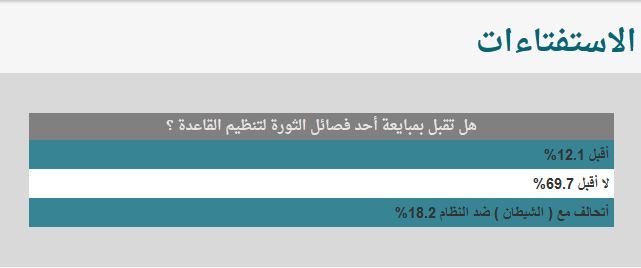The Syrian Coast Reacts to Al-Nusra Front’s Alliance with Al-Qaeda

Youssef Kanaan *
Editor’s Note: Except for the name of the author, Ayman Suleiman, the rest of the names in this article have been changed.
On April 10, Al-Nusra Front, one of the most prominent Islamist groups fighting against the Syrian regime, publicly pledged its loyalty to Ayman al-Zawahiri, who succeeded Osama Bin Laden as leader of Al-Qaeda. The announcement was made in an audio recording released by Al-Nusra Front’s leader Abu Mohammed al-Joulani, in which he described Zawahiri as the “Sheikh of Jihad,” and pledged to “listen to and obey” him.
![Results of a poll conducted by Orient TV, a satellite channel. Credit: Orient TV.] Do you accept the allegiance of a rebel group with Al-Qaeda? I do: 12.1 per cent I do not: 69.7 per cent I would ally myself with the devil against the regime: 18.2 per cent](http://damascusbureau.org/wp-content/uploads/2013/07/Voting-Nusra-Orient-TV1.jpg)
Do you accept the allegiance of a rebel group with Al-Qaeda?
I do: 12.1 per cent
I do not: 69.7 per cent
I would ally myself with the devil against the regime: 18.2 per cent
Reactions to this announcement on Syria’s Mediterranean coast were varied. This area is the ancestral home of President Bashar al-Assad’s Alawite sect, which is largely but by no means universally supportive of the regime. It also hosts a large number of internally displaced Syrians, most of them Sunni, and many of whom support the opposition. Until now, Al-Nusra Front’s announcement has not affected relations between the two communities.
The Damascus Bureau e-mailed several people from the coast who consider themselves in favour of political change in Syria, in order to gauge their reactions to Al-Nusra Front’s new alliance. The results revealed diverse opinions. Some downplayed the importance of the announcement, while others saw it as a negative development that will lead to grave repercussions and will prevent the democratic transition of power in Syria.
Leila, 29, a pharmacist from Lattakia who is sympathetic to the Syrian opposition, characterized the announcement as a “publicity stunt” with limited implications.
“It was circulated in the media to make it seem like a bigger deal than it actually was, especially given that it is not a surprising declaration,” wrote Leila. “There was already a lot of talk about the radical leanings of Al-Nusra Front and how they were [representing Al-Qaeda in Syria].”
Leila did not think the announcement would affect public opinion, because neither supporters nor opponents of the group would be swayed.
Many considered Al-Nusra Front an extremist group even before the latest alliance with Al-Qaeda. Al-Nusra, along with several other Islamist opposition groups in the Aleppo countryside, published a statement on November 19, 2012, announcing their refusal to recognize the Syrian National Coalition, declaring instead the establishment of an Islamic state.
Nabil, 32, an employee in a private company, does not support an armed opposition that seeks to overthrow the regime, but at the same time he does not consider himself a supporter of the government. His opinion was not dissimilar from that of Leila.
“This declaration will not change anything on the ground,” he wrote. “Al-Nusra Front had already been rejected by the people.”
Ayman Suleiman, 39, a poet and writer from Jabla, was of a different mind. He said that by swearing allegiance to Ayman al-Zawahiri, Al-Nusra Front has only strengthened the resolve of regime supporters and their ability to justify the violence [perpetrated by the regime]. He described this latest development as “a strategic asset” to the regime and an embarrassment to the opposition.
“For the regime, [this is] a major strategic gain on the international stage in terms of improving its image abroad and justifying its military operations in the media,” said Suleiman, adding that this has been a source of trouble for the moderate opposition.
Western governments have been reluctant to arm the opposition in fear of strengthening jihadists. So far the United States have only provided non-lethal aid to the rebels on the ground, but is now considering supplying rebels with light weapons after claiming that the Syrian government has used chemical weapons.
Mona, 32, an elementary school English and art teacher from Tartous, also believes that Al-Nusra’s allegiance to Al-Qaeda has benefitted the regime.
“If we look at the results, the actions of Al-Nusra Front, from the beginning, have only benefitted the regime and harmed the revolution,” she explained.
“The existence of Al-Nusra Front and its association with Al-Qaeda will of course affect those who support the regime by increasing their hatred for the opposition, and it will affect the opposition supporters as well,” she continued.
“The peaceful elements of the opposition will start to reconsider their position. This is why I say Al-Nusra Front is [serving] the regime. There is a big difference between the Free Syrian Army and Al-Nusra Front, and we are now witnessing clashes between the two in some areas.”
But Mona played down any possible impact on a political solution between the opposition and the government:
“I don’t think Al-Nusra Front hastened or delayed a political solution. I see unending cycles of violence and blood, and I’m not optimistic, because there is no willingness to reach a resolution, as if all parties have agreed to sustain the status quo, and the Syrian people on both sides are bleeding.”
* Youssef Kanaan is a pseudonym for a journalist living in Syria
